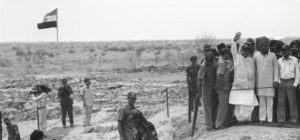Angry Kangaroo, Defiant Tiger

Pokhran II 20th Anniversary
By Rekha Bhattacharjee
Sydney 11th May 2018
“We can also say the date has been engraved in the history of India as a demonstration of its military power,” Indian Prime Minister Narendra Modi said in his monthly radio address “Mann Ki Baat” a few weeks back. The Indian PM was referring to the day on which India conducted nuclear tests at Pokhran in India’s Rajasthan state. PM Modi is not alone in remembering the events of May 1998 so vividly. Some members of the Indian diaspora Down Under still remember the ferocity with which the Australian politicians slammed India for what was described as the “worst act of nuclear bastardry”.
The bilateral ties between India and Australia are experiencing an upswing for the last decade or so. Australia has recognised India as an important strategic partner after a long period of mutual apathy. The bilateral relations have also been described as a rollercoaster ride. The period around the nuclear tests in May 1998 (popularly called Pokhran II) is remembered by the observers of the bilateral ties between the two Indian Ocean Rim countries as a low point.
The audacious Indian action at the Pokhran army range was followed by a phase of an unprecedented frostiness in the Indo-Australian ties.
Some Indo-Australia bilateral relationship observers consider Pokharan II to be a critical milestone as the ferocious Australian criticism could have resulted in a colossal foreign and economic policy failure for Australia. The criticism and patronising tone emanating out of Canberra could have been the proverbial last straw on the camel’s back as Indian media, and masses were beginning to question Australia’s ”˜high-handedness’.
How Australia would react to the nuclear tests under Atal Bihari Vajpayee led NDP government was evident within a few hours of India making the announcement of the nuclear tests to the unsuspecting world.
The Australian Minister for Foreign Affairs Alexander Downer was the first to react as he called in the Indian High Commissioner GP Parthasarathy to convey the Australian Government’s ”˜condemnation of the tests in the strongest possible terms’.
More was to follow as the Australian Government also recalled its High Commissioner from New Delhi for consultations.
“India’s action in conducting three underground nuclear tests is an ill-judged step which could have most damaging consequences for security in South Asia and globally,” Liberal Prime Minister John Howard said in a media release soon after the Pokhran tests announcement was made by India.
“The Government has now decided upon further Australian actions in response to the outrageous acts perpetrated by India in conducting no less than five nuclear tests this week,” then Australian Minister for Foreign Affairs Alexander Downer had thundered in a media release soon after further two nuclear tests were announced by Vajpayee government on 13 May 1998.
The Opposition and business leaders joined the Liberal Government in condemning India’s actions. The choice of words made by the some of these leaders would embarrass Australia for a long time to come.
Labor’s Shadow Minister for Foreign Affairs Laurie Brereton clearly transgressed all norms of diplomatic civility when he said in a media release: Coming on top of India’s three tests on Monday, this is an outrageous act of nuclear bastardry.
If anyone had doubts over the fact that the bilateral relations between India and Australia had touched the lowest point in decades, this statement must have helped in realising the severity of the situation.
Indian community leaders and diplomats posted Down Under had no such doubt.
While the Australian Government’s response to the tests received wide press coverage throughout Australia, the Indian media generally chose to ignore the Antipodean outrage. Some media outlets in India criticised outrageous comments which were slammed as an overreaction.
Indian media outlets were joined by some Australian political commentators in questioning the way India was singled out.
Prof. Antonia Marika Vicziany, the then director of National Centre for South Asian Studies at Monash University, was highly critical of the orientalism and patronising attitude displayed by the Australian politicians and media towards India (and, later, Pakistan).
“”¦western responses to the nuclear tests in South Asia have brought to the fore some of the strongest expressions of ”˜orientalism’ that we have seen for some time and India has been shocked by this,” Prof Vicziany told a Senate Committee in August 1998.
The Australian academic also highlighted another reason which put a serious question mark against the wisdom of those formulating Australia’s foreign policy – the large balance of trade surplus enjoyed by Australia at the time of the Pokhran tests in May 1998. It goes to the credit of the former Prime Minister John Howard as he was quick to realise Australia’s folly in pushing India a little too far. He sent Australia’s Deputy Prime Minister Tim Fischer to India in February 1999 and followed it up with a visit in July 2000.
John Howard visited India again in March 2006 and in a complete turnaround expressed Australia’s willingness to sell nuclear fuel to India. The bilateral relations have improved markedly after that point and now both the Indian Ocean Rim democracies are a part of the Quadrilateral Security Dialogue with the US and Japan being the other two partners.
Rekha Bhattacharjee can be contacted at vijaybhatta56@gmail.com
Short URL: https://indiandownunder.com.au/?p=11016
